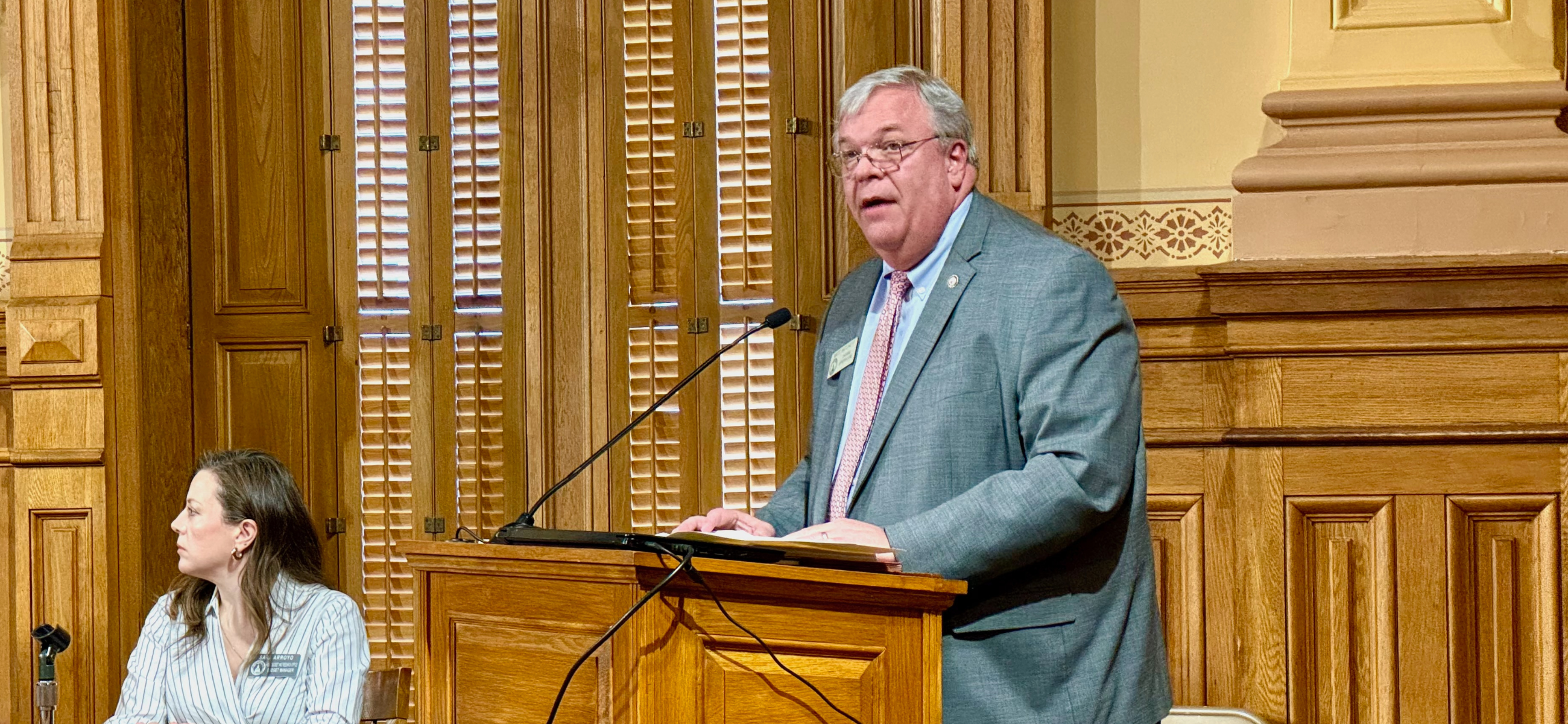Stay ahead of the curve as a political insider with deep policy analysis, daily briefings and policy-shaping tools.
Request a DemoHouse leaders approve governor’s midyear budget with a few new extras

Rep. Matt Hatchett, R-Dublin, chair of the House Appropriations committee, discussed proposed changes to the Amended FY2024 budget on Feb. 6, 2024. (Credit: Jill Jordan Sieder)
The Gist
Southwest Georgia will get money to recruit much-needed nurses. Savannah will get a new behavioral health crisis center. Other communities will get after-school programs, family support for K-12 students and summer programs for pre-K students. More Georgia roads and bridges will get repaired.
Those are just a few additions House lawmakers made to Gov. Brian Kemp’s proposed $37.5 billion amended fiscal year 2024 budget, which passed in the House Appropriations Committee today. It now heads to the House floor for a vote.
What’s Happening
Nailing down a final version of the fiscal 2024 budget is a multi-step process. Now, at mid-year (the fiscal year ends June 30), both the governor and lawmakers have reviewed actual revenues received, forecasted what the state’s remaining budget needs are, and recommended changes to the initial budget passed last spring.
In his proposed amended budget, Kemp added $5.1 billion to the original fiscal 2024 budget, including big-ticket transportation projects, new hospitals, and $1,000 pay raises for state employees. The governor’s budget includes using $2 billion of the state’s $16 billion revenue surplus.
Lawmakers can’t add money to the budget, but they can move money around. In their appropriations bill, HB 915, House budget leaders accepted most of Kemp’s recommendations, and added a few of their own.
Why It Matters
“We’ve got some really good stuff in this budget,” Appropriations Chair Matt Hatchett, R-Dublin, told the House Appropriations Committee Tuesday. He noted that the budget contains an increase of $5.1 billion, or 15.6%, over the original 2024 budget.
For the first time in years, Hatchett said, agencies were able to ask for 3% increases in both the fiscal year 2024 and fiscal year 2025 budgets.
“Agencies were also allowed to ask for strategic one-time enhancements that move the needle on program outcomes, improve customer service or provide significant improvement on how services are delivered to our citizens,” he said. “The House joins the governor in the wise use of tax dollars and one-time needed adjustments in technology, capital and economic development projects as well as human capital investment.”
The House approved the governor’s recommendation of $1,000 pay raises for state workers and recommended raises for social services workers, law enforcement and corrections officers as means of recruitment and retention.
The House budget also calls for $10.4 million to build a child and adolescent crisis stabilization unit in Savannah, and $500,000 to expand mental health services at a facility in Warner Robins.
This is on top of the governor’s proposal to add $50 million for a new medical school at the University of Georgia and $138 million for a new dental school at Georgia Southern University, which the House also approved.
“We’re putting these surplus funds to work in areas that need it,” Hatchett told State Affairs. “Our agencies have gone for years being flat, and the state has grown. There’s need because our service population has grown, there’s need because of inflation … and to keep our workforce competitive with whatever industry you work for in state government, to provide services at a level everyone expects.”
The governor’s budget includes $1.5 billion in new transportation funding. Hatchett said the House “moved some of that money around to help our airports,” including $27 million for a new airport in Spalding County, and $100 million for road resurfacing, bridge repairs and other transportation projects around the state.
Summer transition programs that provide rising pre-K and kindergarten students with extra support in language, literacy and math will receive an extra $8.9 million in Georgia Lottery funds under the House proposal. The program was expanded to serve 4,600 children with federal funds during the pandemic, and lawmakers want to maintain that expansion.

“That summer transition program is fantastic,” said Matt Dubnik, R-Gainesville, who chairs the appropriations education subcommittee. “Think of it as a kickstart program for kids that are transitioning into kindergarten that may or may not have been in pre-K, who need those 5 or 6 weeks in the summer to learn how to be good citizens, how to sit and learn.”
The House budget includes $664 million in new funding to turn a vacant juvenile detention facility in Dodge County into a 30-bed mental health facility for people who’ve been in jail, sometimes for months, awaiting a hearing to determine if they’re competent to stand trial.
Kemp proposed $5.6 million in new funding for security and technology upgrades to prisons to stop cell phones, drugs and other contraband from coming into state prisons. The House increased that amount to $9.8 million.
Here are a few other new expenditures that the House Appropriations Committee has proposed:
- $315,725 for a dedicated sexual assault nurse examiner coordinator at all state-funded sexual assault centers beginning April 1.
- $5 million for technology to allow the Secretary of State to audit ballots without the use of QR codes, and $100,000 to improve election security by adding watermarks to all paper ballots.
- $148,00 for new housing for medical students across the state.
- $50,000 for lupus research and education.
- $250,00 to match a federal grant for a new health center in south Cobb County.
- $12.3 million for dual enrollment education programs.
- $2 million for construction of the Anne Frank Education Center to match $4 million in private donations.
- $300,000 to update a video series for eighth grade courses on Georgia history, geography and economics not updated since 1994.
- $925,000 to give state prisoners three meals a day, instead of two, on weekend days.
What’s Next
HB 915 goes to the full House for consideration this week. Once it passes, the Senate Appropriations Committee will weigh in on the amended midyear 2024 budget. Once passed by the Senate, the two chambers will work out their differences and send the budget to the governor for a final review.
Read these related stories:
Have questions? Contact Jill Jordan Sieder on X @journalistajill or at [email protected] and Tammy Joyner on X @lvjoyner or at [email protected].
And subscribe to State Affairs so you do not miss an update.
X @StateAffairsGA
Instagram@StateAffairsGA
Facebook @StateAffairsGA
LinkedIn @StateAffairs
Professionals still face licensing delays amid state’s transition to online system
The Gist Georgia’s professionals and business owners are still struggling to obtain professional licenses in a timely manner. As the Secretary of State’s Office rolls out its new Georgia Online Application Licensing System to expedite the process, the efficiency of this new process is being put to the test. What’s Happening Thursday morning at the …
Controversy over AP African American Studies class grows
Rashad Brown has been teaching Advanced Placement African American Studies at Atlanta’s Maynard Jackson High School for three years. He’ll continue to do so — even though the state’s top education official removed it from the list of state-funded course offerings for the upcoming school year. While Brown prepares to start teaching his class on …
Students, teachers, lawmakers blast decision to end AP African American history classes
ATLANTA — A coalition of lawmakers, civil rights leaders, clergy, educators and students Wednesday called on the state’s education czar to rescind his decision to drop an advanced placement African American studies class from the state’s curriculum for the upcoming school year. “This decision is the latest attack in a long-running GOP assault on Georgia’s …
Kamala Harris’ presidential bid reinvigorates Georgia Democrats
Georgia Democrats have gained new momentum heading into the November election, propelled by President Joe Biden’s decision to bow out of his reelection bid and hand the reins to Vice President Kamala Harris. The historic decision, announced Sunday, is expected to prove pivotal in the national and state political arenas and breathe new life and …



